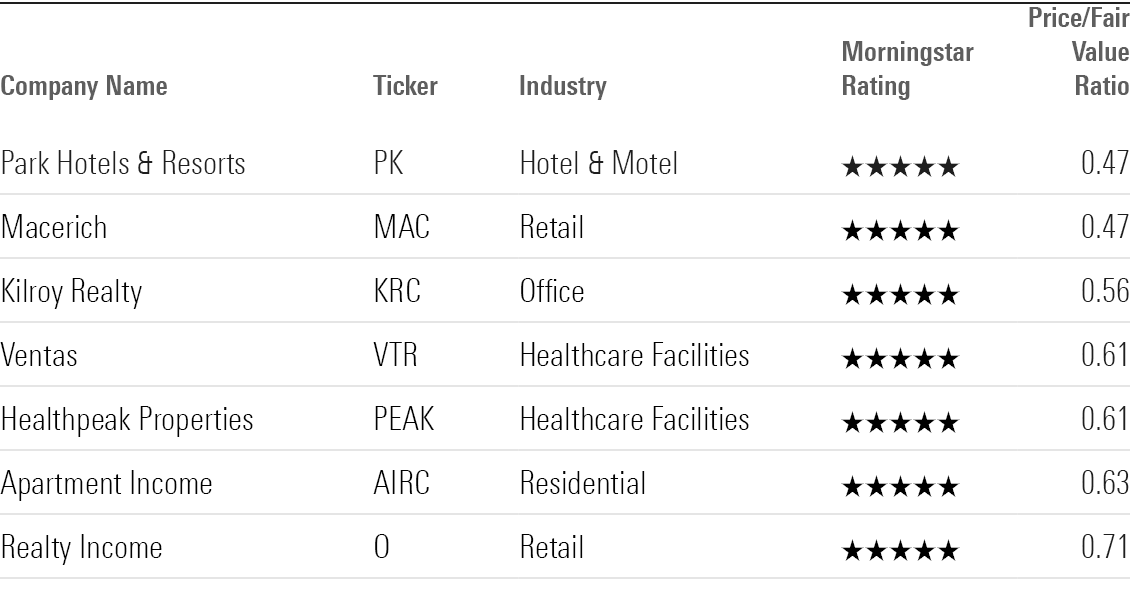7 Undervalued REITs
Many of these dividend-paying stocks are trading at attractive prices.

Real estate investment trusts, often called REITs, have had a rough year, sliding amid worries about the impact of higher interest rates and tight credit.
Despite these headwinds, many REITs are now trading at significantly discounted prices while still offering income through high dividend yields.
“Share prices of U.S. REITs have fallen by approximately 35% from their 2021 highs because of higher interest rates and stress in some commercial real estate sectors,” says Suryansh Sharma, equity analyst at Morningstar. “We think the correction is overdone and the current valuations offer an attractive entry point for patient investors.”
In addition, Sharma says, “We estimate that the average REIT within our U.S. coverage is currently trading at a dividend yield 1.26 percentage points higher than the historical average as of the second quarter of 2023.”
REITs own portfolios of properties—office buildings, shopping centers, hotels, apartments, and more—that generate income from rent and capital appreciation. They differ from traditional stocks in that they are required to pay out at least 90% of that income to investors in the form of dividends, making them attractive for income-focused investors.
Heading into 2022, REITs enjoyed a long period of low interest rates and a booming economy, which led to steadily rising property values and rents. But the headwinds of the past year have taken their toll. In 2023, the Morningstar US Real Estate Index, which measures the performance of mortgage companies, property management companies, and REITs, has fallen even as the overall stock market bounced back.
Morningstar US Real Estate Index
This year the index is down 6.4%, while the broad market as measured by the Morningstar US Market Index has gained roughly 12%. And for the trailing 12 months through Sept. 27, the Real Estate Index was down 2.1% while the Morningstar US Market Index rose 18.8%.
That recent underperformance has been a drag on longer-term performance. The Real Estate Index has gained 2.35% per year for the last three years, far behind the 9.84% average annual return on the overall stock market.
Undervalued REIT Stocks to Buy Now
There are now plenty of undervalued REITs that are strong contenders for long-term investors. Of the 90 real estate stocks in the index, seven were significantly undervalued, having Morningstar Ratings of 5 stars, as of Sept. 21. Another 20 REITs are trading with 4-star ratings.
“We see marked differences in valuation across different REIT sectors in the United States,” says Sharma. “For instance, the industrial sector is only about 10% undervalued, with stock valuations already accounting for future growth, but other sectors like offices, hotels, and malls are trading at attractive discounts.”
For this screen, we focused on those seven REIT stocks rated 5 stars:
- Park Hotels & Resorts PK
- Macerich MAC
- Kilroy Realty KRC
- Ventas VTR
- Healthpeak Properties PEAK
- Apartment Income AIRC
- Realty Income O
The most undervalued stock in this group was Park Hotels & Resorts, trading at a 53% discount to its fair value estimate. The least undervalued stock was Realty Income, trading at a 29% discount.
Undervalued REITs

Park Hotels & Resorts
- Fair Value Estimate: $26.50
- Forward Dividend Yield: 5.68%
“Park Hotels & Resorts owns upper-upscale and luxury hotels, with 26,373 rooms across 41 hotels in the United States. Park also has interests through joint ventures in another 2,656 rooms in four U.S. hotels. Park was spun out of Hilton Worldwide Holdings HLT at the start of 2017, so most of the company’s hotels are still under Hilton brands. The company has sold all its international hotels and many of its lower-quality U.S. hotels to focus on high-quality assets in domestic gateway markets.
“We think Park has some opportunities to create value. We believe management should be able to drive operating margins higher as occupancy continues to recover from the pandemic. The Chesapeake acquisition should provide an additional source of growth as the company drives higher operating efficiencies across this new portfolio. We also think the COVID-19 pandemic created additional ways for Park to increase margins across its portfolio.”
—Suryansh Sharma
Macerich
- Fair Value Estimate: $25.00
- Forward Dividend Yield: 6.21%
“Macerich has successfully repositioned over the past decade as a true owner and operator of Class A regional malls. Over the past 12 years, the company has sold over $4 billion in mostly lower-quality assets, either directly owned or owned through joint ventures, and recycled the capital into acquiring new Class A malls, buying out its partners’ shares in the unconsolidated portfolio or redeveloping its own portfolio. As a result, the company’s portfolio should produce higher tenant sales productivity, occupancy levels, and rent, and it is therefore much better positioned to face the economic headwinds of e-commerce. We expect Macerich to continue improving its portfolio through redevelopment, opportunistic acquisitions, and asset sales, which should deliver strong earnings growth over time.
“Fundamentals for the Class A malls in Macerich’s portfolio have almost fully rebounded from the COVID-19 pandemic. While shopping at brick-and-mortar locations fell as some consumers shifted purchases to e-commerce platforms in 2020, foot traffic has since returned to near-prepandemic levels, leading to a recovery in sales growth. Macerich’s revenue is protected by long-term leases, and while occupancy fell to 89% in 2020, it has almost fully recovered. We believe Class A malls will remain dominant in brick-and-mortar retail, with high-quality malls eventually returning to their prior occupancy and rent levels.”
—Kevin Brown, senior analyst
Kilroy Realty
- Fair Value Estimate: $63.00
- Forward Dividend Yield: 7.18%
“Kilroy owns, develops, acquires, and manages premier office, life science, and mixed-use real estate properties in Los Angeles, San Diego, the San Francisco Bay Area, Seattle, and Austin. It owns 119 properties consisting of approximately 16 million square feet. The company has positioned itself to benefit from the burgeoning life sciences sector with material exposure in its current portfolio and future development pipeline. We also welcome management’s focus on ESG as it aligns its office portfolio to meet the sustainability requirements of its clients.
“Kilroy’s management has been able to successfully time the boom in technological employment occurring in the largest metropolitan areas along the West Coast. The company’s strategy is to achieve long-term maintainable growth by developing and owning the highest-quality real estate in technology and life science market clusters. The quality of their portfolio is evident from the fact that its average age is just 11 years, compared with 30 years for peers.”
—Suryansh Sharma
Ventas
- Fair Value Estimate: $72.00
- Forward Dividend Yield: 3.86%
“Ventas owns a diversified healthcare portfolio of nearly 1,400 in-place properties spread across senior housing, medical offices, hospitals, life sciences, and skilled nursing/post-acute care. The portfolio includes over 40 properties in Canada and the United Kingdom, as the company looks for additional investment opportunities in countries with mature healthcare systems that operate similarly to the U.S. The firm also owns mortgages and other loans that contribute about 3% of net operating income.
“The top healthcare real estate stands to disproportionately benefit from the Affordable Care Act. There is an increased focus on higher-quality care in lower-cost settings. The best owners and operators in the industry, which can provide better outcomes while driving greater efficiencies, should see demand funneled to them from the best healthcare systems. Additionally, the Baby Boomer generation is starting to enter its senior years, and the 80-and-older population, which spends more than 4 times on healthcare per capita than the national average, should almost double over the next 10 years. In the long term, the best healthcare companies are well positioned to take advantage of these industry tailwinds.”
—Suryansh Sharma
Apartment Income
- Fair Value Estimate: $50.00
- Forward Dividend Yield: 5.13%
“Apartment Income owns a portfolio of 74 apartment communities with over 25,000 units. The company focuses on large, high-quality properties in the urban and suburban submarkets of Boston, Denver, Los Angeles, Miami, Philadelphia, San Diego, San Francisco, and Washington, D.C.
“Apartment Income has significantly streamlined its portfolio and strategy over the past decade. While the company has decreased its portfolio from over 300 properties at the end of 2008 to 73 properties in the current portfolio, the company owns approximately the same number of assets over that time frame in the eight markets it currently considers to be its core markets. The company’s exit from markets with lower growth prospects has increased the portfolio’s expected average growth. The company completed the sale of the last of its affordable living and asset management businesses in 2018 after trying to exit these segments for years, since they have limited growth prospects. In 2020, Apartment Income spun off its development pipeline and lease-up portfolio into its own company so that the remaining company could focus on the highest-quality assets. These efforts have brought Apartment Income’s portfolio closer to its peers in terms of both asset quality and market exposure. While the company still has a differentiated portfolio from its peers, we expect it to have similar internal and external growth opportunities.”
—Kevin Brown
Healthpeak Properties
- Fair Value Estimate: $32.50
- Forward Dividend Yield: 6.05%
“Healthpeak owns a diversified healthcare portfolio of approximately 457 in-place properties spread across mainly medical office and life science assets, plus a handful of senior housing, hospital, and skilled nursing/post-acute care assets.
“Given the significant challenges COVID-19 presented to the senior housing industry, Healthpeak made the strategic decision in 2020 to dispose of most of its senior housing assets in multiple transactions for around $4 billion in total proceeds. Healthpeak’s life science and medical office portfolios are now prominently featured in its portfolio, as the proceeds from the senior housing sales were reinvested into these two sectors.
“Healthpeak has high-quality assets in top markets that attract credit-grade tenants in both segments, so we believe it makes sense to strategically focus on the segments where it has an advantage. Despite the possibility of further changes to the ACA, we think any changes will still result in a coordinated value- and outcome-based system that will provide Healthpeak’s current portfolio with strong tailwinds.”
—Suryansha Sharma
Realty Income
- Fair Value Estimate: $76.00
- Forward Dividend Yield: 5.10%
“Realty Income is the largest triple-net REIT in the United States, with more than 13,100 properties that mainly house retail tenants. The company describes itself as ‘The Monthly Dividend Company,’ and its line of business and operating metrics make its dividend one of the most stable sources of income for investors. Even though over 80% of Realty Income’s tenants are in retail, most are focused on defensive segments. They tend to be service-oriented, naturally protected against e-commerce pressures, or resistant to economic downturns.
“Additionally, the triple-net lease structure places the burden of all operational risk and cost on the tenant and requires the tenant to make capital expenditures to maintain the property rather than the landlord. These leases are often for the long term, frequently 15 years with additional extension options, which provides Realty Income with a steady stream of rental income. Coverage ratios are also very high, so tenants are healthy and unlikely to request rent concessions, even during downturns. The steady, stable stream of revenue has allowed Realty Income to be one of only two REITs to be members of the S&P High-Yield Dividend Aristocrats Index and have a credit rating of A- or better. This makes Realty Income one of the most dependable investments for income-oriented investors.”
—Suryansh Sharma
The author or authors do not own shares in any securities mentioned in this article. Find out about Morningstar’s editorial policies.

/s3.amazonaws.com/arc-authors/morningstar/11520ec8-017f-48a5-99dd-e50a7df9126e.jpg)
/cloudfront-us-east-1.images.arcpublishing.com/morningstar/4QBQ2NBJMFG5HGQTDEYCXY5OOI.jpg)
/cloudfront-us-east-1.images.arcpublishing.com/morningstar/2RGHQJTF4ZEURNSAGBY7CSHCUQ.jpg)
/cloudfront-us-east-1.images.arcpublishing.com/morningstar/EAAEIIRVVNE7HNVXBSGTD3WPSI.jpg)
:quality(80)/s3.amazonaws.com/arc-authors/morningstar/11520ec8-017f-48a5-99dd-e50a7df9126e.jpg)